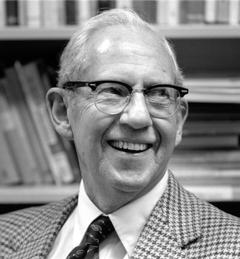George Stigler facts for kids
Quick facts for kids
George Stigler
|
|
|---|---|
 |
|
| Born | January 17, 1911 Seattle, Washington, U.S.
|
| Died | December 1, 1991 (aged 80) Chicago, Illinois, U.S.
|
| Institution | Columbia University Brown University University of Chicago Iowa State University |
| School or tradition |
Chicago School of Economics |
| Alma mater | University of Washington (BA) Northwestern University (MBA) University of Chicago (PhD) |
| Doctoral advisor |
Frank Knight |
| Doctoral students |
Jacob Mincer Thomas Sowell |
| Influences | Jacob Viner, Henry Simons, Milton Friedman |
| Contributions | Regulatory capture theory Industrial organization Search unemployment Stigler diet |
| Awards | Nobel Memorial Prize in Economic Sciences (1982) National Medal of Science (1987) |
| Information at IDEAS / RePEc | |
George Joseph Stigler (born January 17, 1911 – died December 1, 1991) was a famous American economist. He won the Nobel Memorial Prize in Economic Sciences in 1982. He was also a very important leader of the Chicago school of economics, a group of economists with similar ideas.
Contents
Early Life and Education
George Stigler was born in Seattle, Washington. His parents were Elsie Elizabeth and Joseph Stigler. His family had German and Hungarian roots. He even spoke German when he was a child.
He went to the University of Washington and earned his first degree in 1931. After that, he studied at Northwestern University. There, he got his MBA degree in 1932. It was during his time at Northwestern that he became very interested in economics. He then decided he wanted to work in academics.
A Career in Economics
In 1933, Stigler received a scholarship to study at the University of Chicago. He earned his PhD in economics there in 1938. He taught at Iowa State College from 1936 to 1938.
During World War II, he worked at Columbia University. He did important math and statistics research for the Manhattan Project. Later, he spent a year at Brown University. He was a professor at Columbia from 1947 to 1958.
Influences and Friendships
At the University of Chicago, a professor named Frank Knight greatly influenced Stigler. Knight was his PhD advisor. Milton Friedman, who was a friend of Stigler's for over 60 years, said it was amazing Stigler passed his PhD under Knight. Very few students ever did.
Other important people who influenced Stigler included Jacob Viner and Henry Simons. His friends and fellow students, like W. Allen Wallis and Friedman, also played a role.
Key Economic Ideas
Stigler is well-known for his "Economic Theory of Regulation," which he developed in 1971. This idea is also called capture. It suggests that powerful groups and political players might use government rules to help themselves. This theory is part of the public choice field of economics.
He also did a lot of research on the history of economic thought. This means he studied how economic ideas have changed over time.
The Economics of Information
One of Stigler's most important contributions was in his 1961 article, "The Economics of Information." Milton Friedman said that Stigler "created a new area of study for economists."
Stigler believed that information is a very valuable resource. He famously said, "One should hardly have to tell academicians that information is a valuable resource: knowledge is power." He thought that economists had not paid enough attention to how important information is.
Understanding Unemployment
In 1962, Stigler wrote another important article called "Information in the Labor Market." In this paper, he developed the idea of search unemployment. This type of unemployment happens when people are looking for new jobs.
Humor and Recognition
Stigler was known for his sharp sense of humor. He wrote several funny essays. For example, in his book The Intellectual and the Marketplace, he joked about "Stigler's Law of Demand and Supply Elasticities." He said that "all demand curves are inelastic and all supply curves are inelastic too." This was a playful way to make a point about economic studies.
Another funny essay described what would happen if universities were legally responsible for teaching mistakes. The Stigler diet is also named after him, which is a famous problem in economics about finding the cheapest way to get enough nutrients.
Stigler wrote many articles about the history of economics. These were published in top journals. In 1965, he collected 14 of them into a book. The American Economic Review praised his work, saying his essays were "well-known landmarks." They also noted his "lucid prose, penetrating logic, and wry humor."
Stigler was a founding member of the Mont Pelerin Society, a group that promotes classical liberal ideas. He was its president from 1976 to 1978. He was a libertarian and a classical liberal.
He received many honors during his life. He was elected to the American Philosophical Society in 1955. He also joined the American Academy of Arts and Sciences in 1959 and the United States National Academy of Sciences in 1975. In 1987, he was awarded the National Medal of Science.
See also
 In Spanish: George Stigler para niños
In Spanish: George Stigler para niños
- Milton Friedman
- Regulatory capture
- Stephen Stigler, his son
 | DeHart Hubbard |
 | Wilma Rudolph |
 | Jesse Owens |
 | Jackie Joyner-Kersee |
 | Major Taylor |

